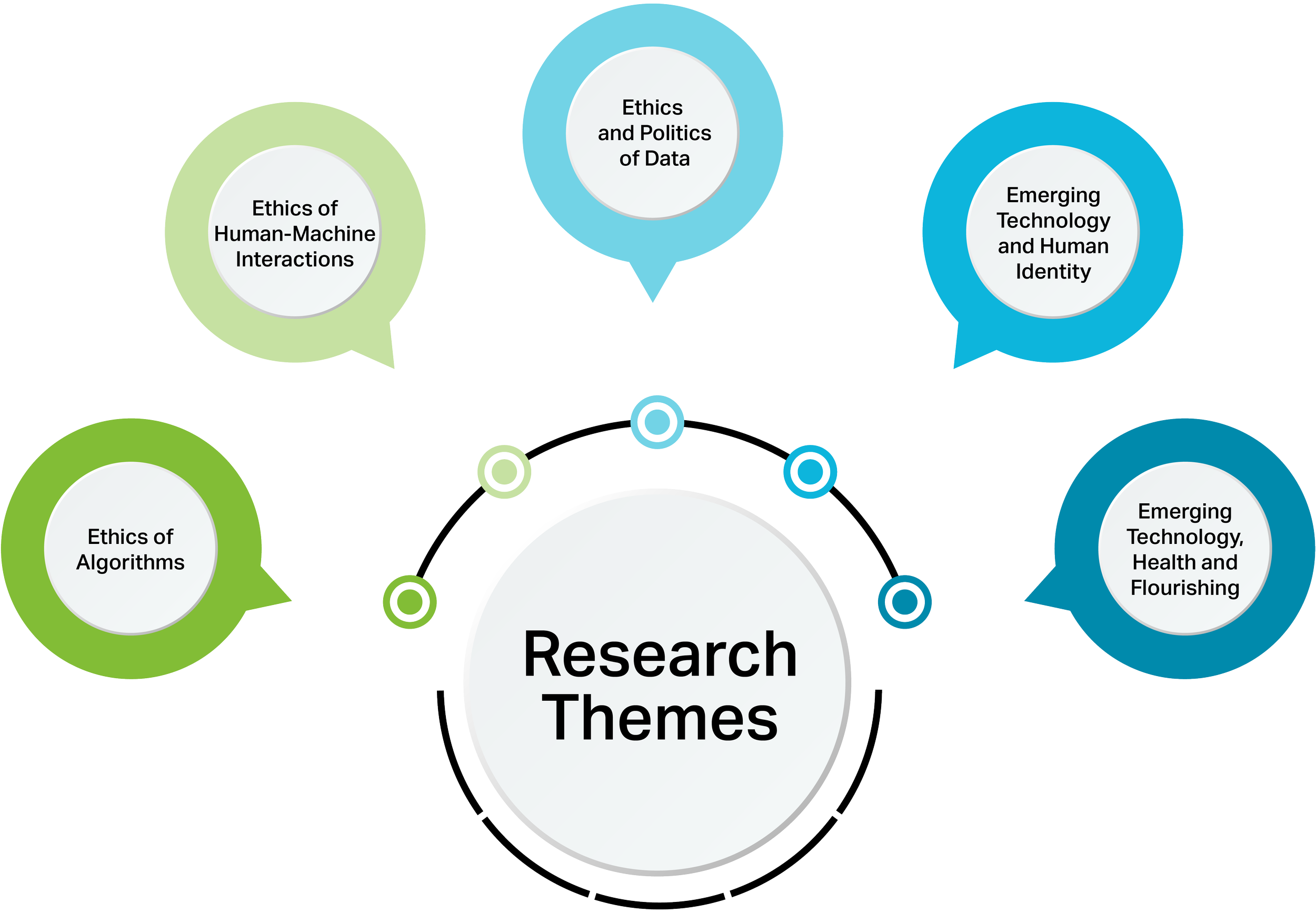
Click below to explore our research themes
Ethics of Algorithms
Algorithmic Transparency and Explainability
Algorithmic Justice, Power, Freedom and Equity
Bias and Discrimination in Machine Learning
Ethics of Algorithmic Decision-Making
Algorithmic Accountability and Responsibility
Ethics of Human-Machine Interactions
Ethics of Automation
Ethics of Artificial Agent and Robot Design
Al 'Smart' Tech and Environments
Ethics of Affective and Social Technologies
Ethics of Knowledge Augmentation
Ethics and Politics of Data
Dataveillance and Data Privacy
Data Justice and Data Violence
Ethics or Data Ownership, Governance and Stewardship
Ethical Data Science and Data Practice
Emerging Technology and Human Identity
Emerging Tech and the Human Image
Al, Automation and Human Wisdom
Emerging Tech and Human Autonomy
Al, Religion, Art and Meaning
Emerging Technology, Health and Flourishing
Emerging Tech and Democratic Flourishing
Emerging Tech and Human Flourishing
Emerging Tech and Community Flourishing
Emerging Tech and Cultural Flourishing
Emerging Tech and Planetary Flourishing
PhD Research
Innovative Baillie Gifford PhD studentships in the Ethics of Data and AI, supervised by multi-disciplinary teams across the University:
Filter your results:
Category
Tag
- Community Flourishing
- Data Ownership
- Democratic Flourishing
- Design
- Emerging Technology
- Emerging technology and human identity
- Engineering
- Ethics
- Ethics and Politics of Data
- Ethics of Algorithms
- Ethics of HMI
- Gerontology
- Governance
- Phenomenology
- Science and Technology Studies
- Stewardship
- Tech and Flourishing
- Tech and Human Identity
Faculty Research
Postdoctoral Research
Research Outputs
Published
Automated Refugee Case Analysis: An NLP Pipeline for Supporting Legal Practitioners, Claire Barale, Michael Rovatsos and Nehal Bhuta, Findings of the Annual Meeting of the Association for Computational Linguistics (ACL), 2023, Toronto, Canada 🔗
The Student as User: Insights from a Student-Level View of Platformisation and Data Assetization in Higher Education, Joe Noteboom, presented at Digital Rentiership and Asset-Making in Higher Education and Beyond Workshop, Lancaster University, 17 May 2023.
Science in the Age of Large Language Models, Abeba Birhane, Atoosa Kasirzadeh, David Leslie, and Sandra Watcher, Nature Reviews Physics, 2023 🔗
In conversation with Artificial Intelligence: Aligning language models with human values, Atoosa Kasirzadeh & Iason Gabriel, Philosophy and Technology, 2023 🔗
A Theological Account of Artificial Moral Agency, Ximian Xu, Studies in Christian Ethics, 2023 🔗
How to Make Sino-Reformed Theology Possible? Retrieving Abraham Kuyper’s Proto-Reformed Contextual Theology, Ximian Xu, Journal of Chinese Theology, 2022 🔗
Skill and self-knowledge: Empirical refutation of the dual-burden account of the Dunning–Kruger effect, Robert D. Mackintosh, Adam B. Moore, Yuxin Liu and Sergio Della Sala, Royal Society Open Science, 2022 🔗
Confessing Faith: Freedom of Conscience, Actualized Confession of Faith, and Confessional Allegiance, Ximian Xu, Horizons, 2022 🔗
Human-centered computing in legal NLP - An application to refugee status determination, Claire Barale, Proceedings of the Second Workshop on Bridging Human–Computer Interaction and Natural Language Processing, 2022 🔗
Virtues in the Digital Age, Shannon Vallor, The Oxford Handbook of Digital Ethics (ed. Carissa Véliz), 2022 🔗
The Oxford Handbook of Philosophy and Technology, Shannon Vallor (ed.), 2022 🔗
Artificial moral advisors: A new perspective from moral psychology, Yuxin Liu, Adam B. Moore, Jamie Webb and Shannon Vallor AIES ’22: Proceedings of the 2022 AAAI/ACM Conference on AI, Ethics, and Society, 2022 🔗
A Bayesian multilevel analysis of belief alignment effect predicting human moral intuitions of artificial intelligence judgements, Yuxin Liu and Adam B. Moore, Proceedings of the Annual Meeting of the Cognitive Science Society, 2022 🔗
Taxonomy of Risks posed by Language Models, Atoosa Kasirzadeh (with Laura Weidinger et al.), FAccT '22: 2022 ACM Conference on Fairness, Accountability, and Transparency, 2022 🔗
Algorithmic and human decision making: for a double standard of transparency, Mario Gunther and Atoosa Kasirzadeh, AI & Society 37(1), 2022 🔗
Algorithmic Fairness and Structural Injustice: Insights from Feminist Political Philosophy, Atoosa Kasirzadeh, AIES '22: Proceedings of the 2022 AAAI/ACM Conference on AI, Ethics, and Society, 2022 🔗
Algorithimic Bias: What is it and what can we do about it? Savina Kim, Smart Data Foundry online panel discussion, 2022 🔗
What is Algorithmic Bias and Why Should We Care?, Bailey Kursar and Savina Kim, Smart Data Foundry (2022) 🔗
The predictive reframing of machine learning applications: good predictions and bad measurements, Alexander Martin Mussgnug, European Journal for Philosophy and Science 12(3), 2022 🔗
Smart Cities in India: Of Data Governance and Democratic Deficits, Aditya Singh and Divij Joshi, Bot Populi, 2021 🔗
Pandemic Public Engagement: An Ethical Analysis, Jamie Webb, UK Pandemic Ethics Accelerator (2021) 🔗
Existentially Adverse Outcomes from AI in the Global South, Aditya Singh and Daniel Vale, Medium, 2021 🔗
Siblings and Discordant Eligibility for Gene Therapy Research: Considering Parental Requests for Non-Trial “Compassionate Use”, Jamie Webb, Lesha D. Shah and Alison Bateman-House, Clinical Ethics 16(4), 2021 🔗
Living and dying with covid: resolving the hard questions of living with covid-19 – the need for public deliberation, Jamie Webb, Hugh Whitall, Pandemic Ethics Accelerator, 2021 🔗
When it Comes to Covid Vaccination, the Terminally Ill Shouldn’t Be Forgotten — They Should Be Prioritized, Jamie Webb, Medium, 2021 🔗
Siri, Talk Dirty to Me : The Ethics of Conversational AI, Aditya Singh, Trilateral Research: Ethical AI, 2020 🔗
The Moderna Vaccine Story is a Cautionary Tale for Coronavirus Reporting, Jamie Webb, Bioethics Today, 2020 🔗
Ethically Allocating COVID-19 Drugs via Pre-approval Access and Emergency Use Authorization, Jamie Webb, Lesha D. Shah and Holly Fernandez Lynch, The American Journal of Bioethics 20(9), 2020 🔗
It’s time to make ClinicalTrials.gov a better tool for patients. Here’s how., Jamie Webb, STAT, 2020 🔗
No Easy Answers in Allocating Unapproved COVID-19 Drugs Outside Clinical Trials, Jamie Webb, Lesha Shah and Holly Fernandez Lynch, The American Journal of Bioethics 20(9), 2020 🔗
Unpacking Policy Moves for Sovereign Control of Data in India, Arindrajit Basu, Elonnai Hickok and Aditya Singh, CyberBRICS, 2019 🔗
Putting placebo-controlled trials in developing countries to the interpersonal justifiability test, Jamie Webb, Developing World Bioethics 19(3), 2018 🔗
Forthcoming
Human Sustainability in the Age of Technology: A Theological Proposal on Technomoral Human Futures, Ximian Xu, Issues in Science and Theology: Global Sustainability, forthcoming in 2023.
Reconciling the governmental use of online targeting with democracy, Atoosa Kasirzadeh (lead author Katja Andric), 2023 ACM Conference on Fairness, Accountability, and Transparency, forthcoming in 2023.
User Tampering in Reinforcement Learning Recommender Systems, Atoosa Kasirzadeh and Charles Evans, AAAI/ACM Proceedings of AI, Ethics, Society (AIES), forthcoming in 2023.
Ethical and Social Risks of Generative Text-to-Image Models, Atoosa Kasirzadeh, Charlotte Bird and Eddie Ungless, AAAI/ACM Proceedings of AI, Ethics, Society (AIES), forthcoming in 2023.
Empowering Refugee Claimants and their Lawyers: Using Machine Learning to Examine Decision-Making in Refugee Law, Claire Barale, International Conference on Artificial Intelligence and Law 2023 (ICAIL 2023) doctoral consortium, forthcoming in 2023.
Exploring university students’ lived experiences of datafication, data literacies and the potential for collective data governance in UK higher education, Joe Noteboom, Data Justice Conference, Cardiff University, forthcoming in 2023.





















